
January 24
1908 Boy Scouts movement begins:
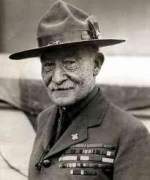
On January 24, 1908, the Boy Scouts movement begins in England with the publication of the first installment of Robert Baden-Powell's Scouting for Boys. The name Baden-Powell was already well known to many English boys, and thousands of them eagerly bought up the handbook. By the end of April, the serialization of Scouting for Boys was completed, and scores of impromptu Boy Scout troops had sprung up across Britain.
In 1900, Baden-Powell became a national hero in Britain for his 217-day defense of Mafeking in the South African War. Soon after, Aids to Scouting, a military field manual he had written for British soldiers in 1899, caught on with a younger audience. Boys loved the lessons on tracking and observation and organized elaborate games using the book. Hearing this, Baden-Powell decided to write a nonmilitary field manual for adolescents that would also emphasize the importance of morality and good deeds.
First, however, he decided to try out some of his ideas on an actual group of boys. On July 25, 1907, he took a diverse group of 21 adolescents to Brownsea Island in Dorsetshire where they set up camp for a fortnight. With the aid of other instructors, he taught the boys about camping, observation, deduction, woodcraft, boating, lifesaving, patriotism, and chivalry. Many of these lessons were learned through inventive games that were very popular with the boys. The first Boy Scouts meeting was a great success.
With the success of Scouting for Boys, Baden-Powell set up a central Boy Scouts office, which registered new Scouts and designed a uniform. By the end of 1908, there were 60,000 Boy Scouts, and troops began springing up in British Commonwealth countries across the globe. In September 1909, the first national Boy Scout meeting was held at the Crystal Palace in London. Ten thousand Scouts showed up, including a group of uniformed girls who called themselves the Girl Scouts. In 1910, Baden-Powell organized the Girl Guides as a separate organization.
The American version of the Boy Scouts has it origins in an event that occurred in London in 1909. Chicago publisher William Boyce was lost in the fog when a Boy Scout came to his aid. After guiding Boyce to his destination, the boy refused a tip, explaining that as a Boy Scout he would not accept payment for doing a good deed. This anonymous gesture inspired Boyce to organize several regional U.S. youth organizations, specifically the Woodcraft Indians and the Sons of Daniel Boone, into the Boy Scouts of America. Incorporated on February 8, 1910, the movement soon spread throughout the country. In 1912, Juliette Gordon Low founded the Girl Scouts of America in Savannah, Georgia.
In 1916, Baden-Powell organized the Wolf Cubs, which caught on as the Cub Scouts in the United States, for boys under the age of 11. Four years later, the first international Boy Scout Jamboree was held in London, and Baden-Powell was acclaimed Chief Scout of the world. He died in 1941. (History.com)
[Note: Baden-Powell appeared on the list of those whom the Nazis proposed to arrest after landing in the United Kingdom. His movement was regarded with suspicion by the Nazis, who considered it a potential source of espionage.]
1911: Shusui Kotoku and ten other anarchists: Eleven Japanese anarchists were hanged for plotting the assassination of the Emperor. [For further details, Click here.]
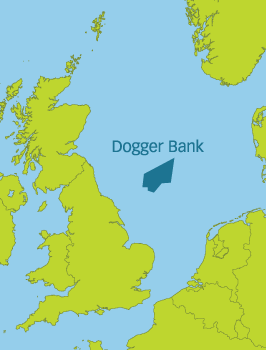
1915 World War I: War at Sea: A British fleet under Admiral Beatty defeats the Germans under Von Hipper at the battle of Dogger Bank, sinking the armored cruiser Bluecher, killing 870.
The Bluecher was now out of action, and the Arethusa gave the coup de grace by slipping in two torpedoes at her just as we slewed around. These caused frightful havoc, one bursting in the engine-room and the other just below the fore turret, and rapidly caused her to capsize. She was before this a battered wreck on deck, practically all her gun crews were killed, and her officers drove the men from the stoke-hole at their sword points to re-man the guns. This was told us by the German prisoners aboard, and one or two of them have wounds which they said had been caused by their own officers' swords . . . The Bluecher, which had capsized, was lying awash, with her side just out of the water and men standing on it, while all around there seemed hundreds swimming and drifting in cork jackets toward us. We were very close; in fact, it seemed dangerously so. I shall never forget the sight.
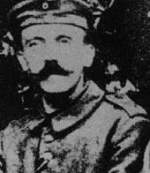
Gefreiter Adolf Hitler again writes his Munich friend, the tailor Josef Popp, from the front lines:
Because of the constant rain—we do not have winter—the closeness of the ocean, and the low-flying terrain, the meadows and fields are like bottomless morasses, while the streets are covered with slimy mud; and through these swamps run the trenches of our infantry, a mass of shelters and trenches with gun emplacements, communication ditches and barbed wire barricades, wolf lairs, land mines: in short, an almost impossible position." [For further details, Click here.]
1916 World War I: Conscription to the Armed Forces is introduced in Britain.
Upwards of 2,800,000 men offered themselves, this in itself being a fine tribute to the old voluntary system. But when the figures came to be analysed, and the men themselves to be examined, the total number available for service was disappointing. Our national task involved far more than the maintenance of new armies in all parts of the world. There was the navy - the greatest navy the world had ever known - and there were munitions not only for ourselves but also for our Allies. There was also the vital need to sustain food-supplies and national credit, as well, also, to a large extent, the credit of the Allied Powers: and all this hinged largely on the export trade from this country, which demanded a vast amount of industrial labour. Hence the need for exemptions and the establishment of tribunals all over the country to consider the appeals both of masters and men. Women came to the rescue by the hundred thousand, and proved excellent workers; but even when this fact and the help of all other kinds of unskilled labor were taken into account, it was impossible in a complex society like ours, with its worldwide responsibilities, to put all our able-bodied men into the fighting services. The very number and scale of the exempted men made conscription inevitable.
1918 World War I: Summary of Count Hertling's Speech to the Reichstag:
(1) The negotiations at Brest-Litovsk prove "that we are quite ready to accept this proposal [President Wilson's first point, on no secret international agreements] and declare publicity of negotiations to be a general political principle."
(2) There is "no difference of opinion" with Mr. Wilson in respect to his second point, on freedom of the seas; but to realize this it would be well if the fortifications at Gibraltar, Malta, Aden, Hong-Kong, and other places should be removed. (3)
The Central Powers are "in thorough accord with the removal of economic barriers which interfere with trade in a superfluous manner" and "condemn economic war."
(4) "The idea of limitation of armaments is entirely discussable."
(5) As to colonies, "Mr. Wilson's principles will encounter some difficulties in the realm of reality.
1924 USSR: St. Petersburg is renamed Leningrad in honor of the late revolutionary leader, Vladimir Lenin.
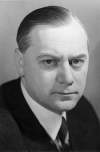
1934 Alfred Rosenberg is appointed deputy of the Fuehrer for the supervision of the spiritual and ideological training of the National Socialist Party. (THP)
1935 Poland: Jozef Lipski: the Polish ambassador to Germany, meets with Hitler again. Hitler tells Lipski that "the moment will come when Poland and Germany will be forced to defend themselves from Soviet aggression."
1938 Death: Han Fuqu—Koumintang general: On this date in 1938, Chinese warlord Han Fuqu (or Fuju, or Fu-chu) was executed by the Koumintang for cravenly surrendering Shandong Province to the Japanese without a fight. [For further details, Click here.]1939 Holocaust:

Goering orders Reinhard Heydrich to establish the Reich Central Office for Jewish Emigration. It is established to organize and accelerate the emigration of the Jews. Heydrich names Gestapo chief Heinrich Mueller to head the department. Almost 80,000 Jews will leave Germany in 1939.
Germany and Poland reach an agreement on Jewish deportees. One thousand Jews at a time may return to Germany to settle their accounts. A special proprietary account for this purpose will be set up in Germany for deposits only. (THP)

1941 Death: Gottfried Feder: leading ideologist and cofounder of the DAP. Feder drafted the first Nazi party program, but his influence waned during the early 1930's.
1943 World War II: Various:
Stalingrad: Von Paulus to Hitler: Let us surrender!

On this day, German Gen. Friedrich von Paulus, commander in chief of the German 6th Army at Stalingrad, urgently requests permission from Adolf Hitler to surrender his position there, but Hitler refuses.
The Battle of Stalingrad began in the summer of 1942, as German forces assaulted the city, a major industrial center and a prized strategic coup. But despite repeated attempts and having pushed the Soviets almost to the Volga River in mid-October and encircling Stalingrad, the 6th Army, under Paulus, and part of the 4th Panzer Army could not break past the adamantine defense of the Soviet 62nd Army.
Diminishing resources, partisan guerilla attacks, and the cruelty of the Russian winter began to take their toll on the Germans. On November 19, the Soviets made their move, launching a counteroffensive that began with a massive artillery bombardment of the German position. The Soviets then assaulted the weakest link in the German force-inexperienced Romanian troops. Sixty-five thousand were ultimately taken prisoner by the Soviets.
The Soviets then made a bold strategic move, encircling the enemy, and launching pincer movements from north and south simultaneously, even as the Germans encircled Stalingrad. The Germans should have withdrawn, but Hitler wouldn't allow it. He wanted his armies to hold out until they could be reinforced. By the time those fresh troops arrived in December, it was too late. The Soviet position was too strong, and the Germans were exhausted.
By January 24, the Soviets had overrun Paulus' last airfield. His position was untenable and surrender was the only hope for survival. Hitler wouldn't hear of it: "The 6th Army will hold its positions to the last man and the last round." Paulus held out until January 31, when he finally surrendered. Of more than 280,000 men under Paulus' command, half were already dead or dying, about 35,000 had been evacuated from the front, and the remaining 91,000 were hauled off to Soviet POW camps. Paulus eventually sold out to the Soviets altogether, joining the National Committee for Free Germany and urging German troops to surrender. Testifying at Nuremberg for the Soviets, he was released and spent the rest of his life in East Germany. (History.com)
[See: What Were Adolf Hitler's Major Blunders?]
Stalingrad: Joseph Goebbels prepares the German people for the bad news:
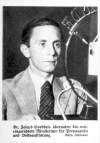
At home we are living life in a way that in some respects is anything but appropriate for war time. We do not want to split hairs here, promoting a wartime lifestyle that depends entirely on outward appearances. We do not want to insist on privations that have no significance, but will have deep impact on our whole lifestyle, as well as on our thoughts and feelings. It would, for example, be a mistake to close the movies, concert halls, and theaters to prove that we are at war and must be serious about everything. We do not need to prove how serious war is. That will come on its own.
World War II: Casablanca Conference: A meeting between Prime Minister Winston Churchill and President Franklin Roosevelt at Casablanca ends with demands for unconditional surrender and plans made for a cross-channel landing in 1944.
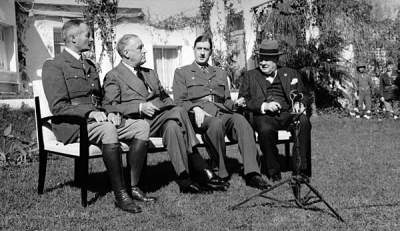
The importance of the unconditional surrender declaration can be seen in several ways. First, it showed both the British and American desire to permanently eliminate the threat of Germany. This assured the Soviets that the US and Britain were in the fight to the end, thus encouraging the Soviets to keep fighting on the western front, even while a cross-channel attack was being delayed. Secondly, the declaration crushed any hope Hitler may have had of a peace negotiation. It was believed that this declaration hung Hitler out to dry, leaving him to face his foreseeable defeat. This Conference helped to pave the way for the final Allied victory in Europe, VE-Day. The Conference was also the first time that the two disassociated French leaders, Henri Giraud and Charles de Gaulle, were brought together. [See: Why Did Hitler Insist on No Surrender?]

1944 World War II: Katyn Massacre: A Soviet Special Commission spuriously claims that the Nazis are guilty of Katyn.
1945 World War II: Various:

Harry Hopkins, FDR's advance man for the upcoming meeting of the Big Three in the Crimea, cables President Roosevelt from London:
Churchill . . . says that if we had spent years on research we could not have found a worse place than MAGNETO (the code name for Yalta) but that he feels that he can survive it by bringing an adequate supply of whiskey. He claims it is good for typhus and deadly on the lice which thrive in these parts. (Harriman)

Army Group Vistula: Hitler approves Panzer Leader General Heinz Guderian's plan to create a new, emergency army group to be known as Army Group Vistula. Bormann had suggested to Hitler that he give the Reichsfuehrer SS the command, knowing that the chances that Himmler, his rival, will distinguish himself are nonexistent. SS leader Heinrich Himmler, who has no operational talent or experience, is now appointed by Hitler to lead Army Group Vistula, the main function of which will be to oppose the main Soviet thrusts. This is seen as an extreme insult by the German General Staff and Guderian, who blows up at the idea of 'such an idiocy being perpetrated on the Eastern Front.' Even Hitler will later admit that Himmler is a complete bust as a fighting leader, spending the most difficult periods of his command in a clinic with a 'nervous stomach.' (Read) [See: The Last Days of the Third Reich.]
General Guderian meets with Reich Foreign Minister von Ribbentrop. He tells him that the war is lost, and urges him to negotiate an immediate armistice in the West. Ribbentrop acts sympathetic, swears him to secrecy, and then subsequently runs to Hitler with a squealer's version of Guderian's views. Two days later, Hitler will express his fury to Keitel within earshot of Guderian:
So, when the Chief of the General Staff goes to see the Foreign Minister and informs him of the situation in the East with the object of securing an armistice in the West, he is doing neither more nor less than committing high treason . . . . In the future, anyone who tells anyone else that the war is lost will be treated as a traitor, with all the consequences for him and his family. I will take action without regard to rank and reputation! (Read, Kershaw) [See: Why Did Hitler Insist on No Surrender?]
From Field Marshal Wilhelm Keitel's SBS interview: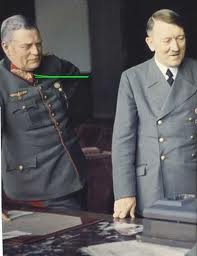
It was one of the most remarkable traits of the Fuehrer that he drew a line between political and military affairs. He told his soldiers: 'Don't discuss politics, this isn't what you are here for, but do what I tell you.' In other words, don't put your fingers into every pie. Nobody was supposed to know more of any matter than was absolutely necessary for the task. [See: Was Adolf Hitler an Insecure Dictator?]
France: The French First Army takes several crossings over the Ill River in Alsace.
1946 Nuremberg Tribunal: Day 42:

Continuation of Sir David Maxwell-Fyfe's Presentation of the case against Constantin von Neurath.
Beginning of M. Charles Dubost's Presentation of the case regarding atrocities committed in the occupied countries of the west.
When stating the charges which now weigh upon the defendants, my British and American colleagues showed evidence that these men conceived and executed a plan and plot for the domination of Europe. They have shown you of what crimes against peace these men became guilty by launching unjust wars. They have shown you that, as leaders of Nazi Germany, they had all premeditated unjust wars, and had participated in the conspiracy against peace.
Then my friends and colleagues of the French Delegation, M. Herzog, M. Faure and M. Gerthoffer, submitted documents establishing that the defendants, who all in various positions counted among the leaders of Nazi Germany, are responsible for the repeated violations of the laws and 'customs of war committed by men of the Reich in the course of military operations. However, it still remains for us to expose the atrocities of which men, women, and children of the occupied countries of the west were victims.
We intend at this point to prove that the defendants, in their capacity as leaders of Hitlerite Germany, systematically pursued a policy of extermination, the cruelty of which increased from day to day until the final defeat of Germany; that the defendants planned, conceived, willed, and prescribed these atrocities as part of a system which was to enable them to accomplish a political aim. It is this political aim which closely binds all the facts we intend to present to you. The crimes perpetrated against people and property, as presented so far by my colleagues of the French Prosecution, were in close connection with the war. They had the distinct character of war crimes stricto sensu. Those which I shall present to you surpass them both in meaning and extent. They form part of the plans of a policy of domination, of expansion, beyond war itself. [For the full text of today's proceedings, Click here.]
1957 Wunderwaffen: From an NSC (National Security Council) Memorandum:
Dr. Waterman pointed out that an earth satellite was unique as a means of observing space because, once it was in position, it observed without the need of any unit of propulsion. Accordingly, if successfully launched, the earth satellite would provide us with a continuous record of information on outer space. Such information would be of enormous value . . . .
In view of the above possibilities, Dr. Waterman believed that ordinary prudence suggested that we do all we possibly could to achieve this kind of information. Dr. Waterman also pointed out that the United States was now taking the lead—as compared to the Soviets—in the development of instrumentation for satellites. While he believed that the Russians might well surprise us in the achievement of a launching unit, he did not believe that they were likely to equal us in the instrumentation of the satellite itself, although they will do their utmost to try to get ahead of us in this area also.
The foregoing remarks, continued Dr. Waterman, explained the recommendations of the National Science Foundation for a program to include six extra satellites. Such a program of twelve launchings Dr. Waterman believed would guarantee at least one successful launching. [For further details, Click here.]

1965 Death: Winston Churchill, the man who did more to stop Adolf Hitler than anyone, at age 90. After telling his son-in-law, Christopher Soames: "I am so bored with it," he never again makes an intelligible remark to anyone. Note: Churchill dies at his home at 28 Hyde Park Gate in London shortly after 8:00 AM on the seventieth anniversary of the death of his father, Sir Randoph Churchill.
[Since one mere link is insufficient for a giant such as Churchill, see also, The Life and Times of Winston Churchill , and New World Encyclopedia - Winston Churchill, and Winston Churchill - United States History , and Winston Churchill - History Learning Site .]1972 Straggler: Japanese soldier Shoichi Yokoi is discovered on Guam, having (perhaps) spent 28 years hiding in the jungle thinking World War II is still going on.
While the person was being transported to Agana Police Headquarters, the Straggler related to Lieutenant Cruz that it has been thirty years since he left his home in Japan. That he came to Guam before the US invasion. He was an Army Sergeant. He had been hiding at the area since the invasion with two other Japanese Stragglers, but later they separated. "We dug a cave in a bamboo thicket, but after a few months our food ran out. The others moved to a new hiding place where there was more food. We visited each other." About 8 years ago, he found both of them dead. "I believe they died of starvation". That the pants and shirt he was wearing were made of local fibers (hibiscus bark) and he made them himself.
1980 Cold War: U.S. announces military equipment sales to China:
In an action obviously designed as another in a series of very strong reactions to the Soviet invasion of Afghanistan, U.S. officials announce that America is ready to sell military equipment (excluding weapons) to communist China. The surprise statement was part of the U.S. effort to build a closer relationship with the People's Republic of China for use as leverage against possible Soviet aggression. [For further information, click here]
Edited by Levi Bookin (Copy editor)
levi.bookin@gmail.com



Click to join 3rdReichStudies

FAIR USE NOTICE: This site may contain copyrighted material the use of which has not always been specifically authorized by the copyright owner. We are making such material available in our efforts to advance understanding of historical, political, human rights, economic, democracy, scientific, environmental, and social justice issues, etc. We believe this constitutes a 'fair use' of any such copyrighted material as provided for in section 107 of the US Copyright Law. In accordance with Title 17 U.S.C. Section 107, the material on this site is distributed without profit to those who have expressed a prior interest in receiving the included information for research and educational purposes. If you wish to use copyrighted material from this site for purposes of your own that go beyond 'fair use', you must obtain permission from the copyright owner.
Please note that the list-owner and the moderators are not responsible for, and do not necessarily approve of, the random ads placed on our pages by our web server. They are, unfortunately, the price one pays for a 'free' website.